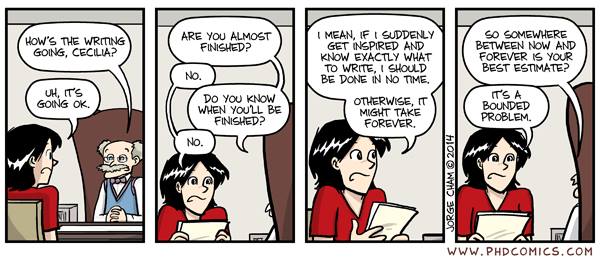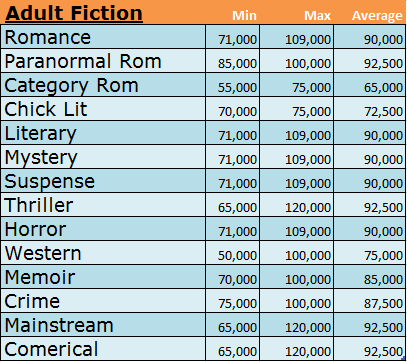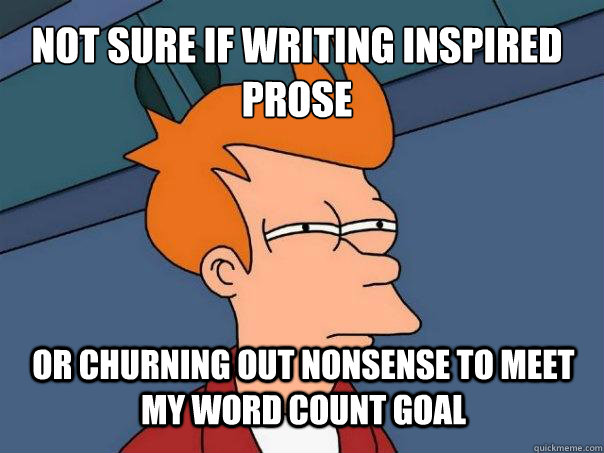Hello, hello! It’s that time again. Today, I want to talk a bit about word count. It’s a subject that Lew Andrada suggested when I asked for questions and comments and all that. It’s also a subject I struggle with, because it’s pretty arbitrary. Anyone you ask seems to have a different answer when it comes to the correct lengths of things.
We’ve all encountered a scenario like this one. I actually kind of think that’s where the concepts of word counts really help (me at least). It gives me a firm goal to keep in mind and work toward, that way I can have a more realistic idea of how long a project will take me to finish.
So, how do I approach word count? I keep it simple! I basically follow SFWA’s counts for the Nebula awards. In other words, these rules:
Short Story: less than 7,500 words.
Novelette: 7,500 words to 17,500 words.
Novella: 17,500 words to 40,000 words.
Novel: 40,000 words or more.
Now, I know that “novel” is an extremely broad category that can be broken down by genres or even target audience age. In fact, the list above is just one example of many break downs you’ll find with a quick Google search. No, none of them are the same. Yes, it gets really confusing really fast. On top of all that, you also have lists for middle grade, young adult, adult, and a relatively new category dubbed new adult. It’s complicated. I don’t like complicated things.
In other words, I don’t bother with all of that crap. My goal is based on my story. If I’m going for a flash fiction piece (<1000), I usually aim for 900 words. A short story? Around 5,000 words. A novel? It depends on what it feels like. I tried for 70,000 to 75,000 for my first novel after tons of research on word count. It is a supernatural YA, so on top of feeling like a good amount, it also turns out to be a fairly average count for that type of book. The novel I’m currently working on is different. I’m going more by my gut for this one. My current aim is 80,000 to 90,000 just because that’s what it feels like it will need. I’m sure my past research is playing some kind of unconscious role, but whatever.
On the other hand, enforcing a word count can lead to fears of rambling. Don’t worry! You can fix all of that during edits. That’s also another factor that goes into choosing my own word count. I like to choose a middling number, just in case I need the wiggle room. I have space to brutally cut out all of the nonsense if I need to, but I also have room to fix anything that’s not fleshy enough.
What I mean to say is that word counts are great tools, but don’t let them freak you out. Let them help you establish a more concrete timeline for finishing your work, but don’t let them rule your work. Keep it simple and fun, or it’s not worth doing. At least that’s how I feel about it. What are your thoughts on word count?




I have a huge problem with being too verbose! For me, word count limits are a good thing because it prevents me from wandering into unnecessary tangents and sub-plots. It’s something I’ve struggled with this semester (much to my mentor’s despair, I’m sure). Only once have I been told that expanding a short story to a novelette would make it better. More often than not, I’ve been advised to “kill my darlings.”
The chart is interesting. I had no idea that the average adult novel comes in around ~90k words. While reading, it’s hard for me to tell what the word count is because page and font sizes aren’t standardized (even worse when reading an e-book because they can easily be re-formatted). It’s a bit of a surprise. I assumed they averaged between 60-70k words. Maybe I should stop trying to write short stories and jump into novels instead. But that’s another can of worms for a different day. 😉
I like your strategy to aim not for the max word count, but rather somewhere below that. It would help keep the story concise and provide some wiggle room just in case more needs to be added (or taken away). This is something I’ll aim for with future stories.
Great post! And thank you for the generous shout out. 🙂
LikeLiked by 1 person
You should definitely try jumping into novels! Stonecoast is a great place to do that. I had only ever written short stories until I got there. It was a hard transition for me, since I have the opposite problem. I almost always have to flesh out things before I can trim anything away. It makes me feel like Hansel and Gretel’s witch, having to fatten them up before I kill them.
LikeLiked by 1 person
LOL. That’s a good way of putting it. Poor Hansel and Gretel. My last two attempts at a novel went didn’t go so well, but if I get inspired to try again, I’d love to do it through Stonecoast. I think it’s a safe environment to try things out of my comfort zone.
LikeLiked by 1 person
It really is a good place for that!
LikeLiked by 1 person